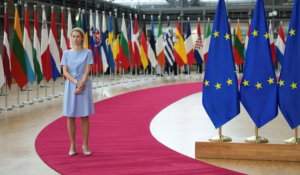EU delays Israel sanctions decision, warns Gaza humanitarian crisis must improve

EU foreign policy chief Kaja Kallas at EU headquarters in Brussels, 23 June 2025
Liza Rozovsky reports in Haaretz on 25 June 2025:
European Union foreign ministers postponed a decision Monday on potential sanctions against Israel, pushing the issue to their next meeting in mid-July.
EU foreign policy chief Kaja Kallas said that in the meantime, she and other ministers plan to remain in contact with Israel and press it to improve the humanitarian situation in Gaza.
“The review is very clear, and we have to improve the situation that Israel has been breaching Article Two,” Kallas said, referring to the clause in the EU-Israel Association Agreement requiring respect for human rights. “It is not intended to punish Israel, but to trigger concrete improvements for the people and the lives of people in Gaza.”
Kallas emphasized that Monday’s discussion was only the beginning. One possible step under consideration, she said, is halting trade with Israeli settlements – a move that several EU member states, led by Belgium, are actively promoting.
She cited the 2024 advisory opinion by the International Court of Justice in The Hague, which determined that Israel’s occupation of the Palestinian territories is illegal and called on UN member states to refrain from economic ties with the settlements. An EU official present at the meeting said the European Commission – the bloc’s executive arm – is scheduled to meet on Wednesday and discuss possible measures against Israel. Kallas will have to present a list of potential steps at the next foreign ministers’ meeting on July 15, which could lead to concrete decisions if the situation in Gaza does not show significant improvement.
Among the steps being discussed are the suspension of trade with Israeli settlements, as mentioned by Kallas. Personal sanctions against far-right ministers – similar to those recently imposed by the U.K. and other countries on National Security Minister Itamar Ben-Gvir and Finance Minister Bezalel Smotrich – are also on the table. Sweden is promoting a similar initiative for sanctions on far-right ministers, while Spain is pushing for a full suspension of the EU-Israel free trade agreement – a move seen as unlikely to gain the required unanimous support.
As previously reported by Haaretz, Hungary has been blocking sanctions for months on seven individuals and entities linked to the settlements. Budapest has conditioned its support for sanctions on settlers on expanding sanctions to include individuals accused of supporting Hamas.
The EU has drafted a broader sanctions list in line with Hungary’s demand, but when Kallas raised the issue during Monday’s meeting, it emerged that Hungary’s foreign minister had already left – stalling a decision.
According to the EU official, Spanish Foreign Minister José Manuel Albares’ proposal to suspend the free trade agreement sparked tension in the room, prompting German Foreign Minister Johann Wadephul to state that “suspending the agreement with Israel is out of the question.” The official added that Wadephul may have misunderstood the scope of the discussion, which did not formally include the EU-Israel Association Agreement. That agreement would require unanimous approval for any suspension – a scenario considered politically unlikely.
This article is reproduced in its entirety
